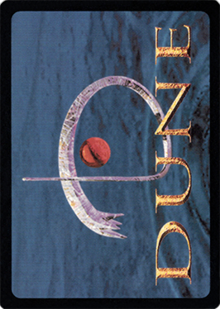
Illuminati: New World Order (INWO) is an out-of-print collectible card game (CCG) that was released in 1994 by Steve Jackson Games, based on their original boxed game Illuminati, which in turn was inspired by the 1975 book The Illuminatus! Trilogy by Robert Anton Wilson and Robert Shea. An OMNI sealed-deck league patterned after the Atlas Games model was also developed.
Star Wars: Customizable Card Game (SW:CCG) is an out-of-print customizable card game based on the Star Wars fictional universe. It was created by Decipher, Inc., which also produced the Star Trek Customizable Card Game and The Lord of the Rings Trading Card Game. The game was produced from December 1995 until December 2001. Since 2002, the game has been maintained by the Star Wars CCG Players Committee, with new virtual cards being released every few months and the capability to play both in person and online.
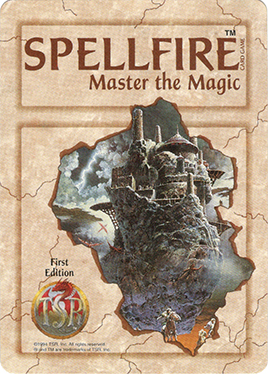
Spellfire: Master the Magic is an out-of-print collectible card game (CCG) created by TSR, Inc. and based on their popular Dungeons & Dragons role playing game. The game appeared first in April 1994, shortly after the introduction of Magic: The Gathering, in the wake of the success enjoyed by trading card games. It was the second CCG to be released, preceding Wizards of the Coast's second CCG Jyhad by two months.

The Babylon 5 Collectible Card Game is an out-of-print collectible card game set in the Babylon 5 universe. The game is ideally set for 4-5 players but can be played with a minimum of two players up to as many as 20 if using multiple Non-Aligned Factions and Home Factions. This CCG is distinct from most others of the genre for being specifically designed to be played by more than two players. The gameplay tends to have strong political elements encouraging significant player interaction aka "table talk" which is appropriate for a game based on a series which featured such a strong element of political intrigue. During its six-year existence under the Precedence Entertainment banner it released two core sets, five expansions sets and one revision set. There were two World Championships during that time. The game still continues to have a cult following as further expansions were made available online.

Middle-earth Collectible Card Game (MECCG) is an out-of-print collectible card game released by Iron Crown Enterprises in late 1995. It is the first CCG based on J.R.R. Tolkien's fictional universe of Middle-earth, with added content from ICE's Middle-earth Role Playing Game.
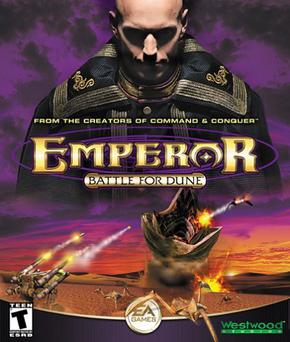
Emperor: Battle for Dune is a real-time strategy video game, released by Westwood Studios in June 2001. It is based in Frank Herbert's science fiction Dune universe. It follows its predecessors, Dune II and Dune 2000. While Dune II was a distinct story to that of Dune, and Dune 2000 was a remake of Dune II, Emperor: Battle for Dune is a direct sequel to the previous games. In particular, it is a sequel to Dune 2000, carrying on from where it left off, with several of the characters and actors returning. Like Dune 2000 and many of the other Westwood games that came before it, Emperor features live action cut scenes filmed with actors.
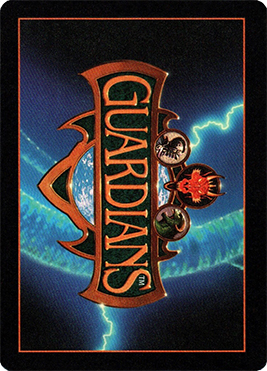
Guardians is a fantasy-themed collectible card game (CCG) published by Friedlander Publishing Group (FPG) in 1995. The initial set was sold in 60-card starter decks and 14-card booster packs.

The X-Files Collectible Card Game is an out-of-print collectible card game based on The X-Files fictional universe. The game was developed by NXT Games and published by the US Playing Card Company (USPCC) in 1996. The game was canceled in early 1998.
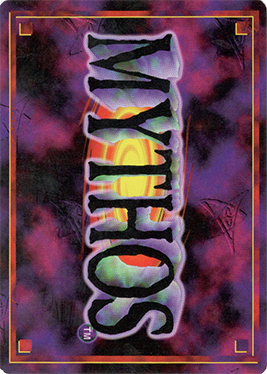
Mythos is an out-of-print collectible card game published by Chaosium. It is based on the Cthulhu Mythos stories of the horror author H. P. Lovecraft, as well as on Chaosium's own Call of Cthulhu role-playing game.

Galactic Empires is an out-of-print collectible card game with a science fiction theme. It was published by Companion Games in 1994 until the company's bankruptcy in 1997.
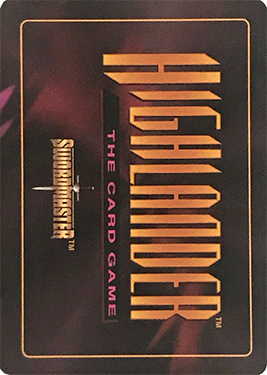
Highlander: The Card Game is an out-of-print collectible card game based on the Highlander franchise of films and television series. It was released in March 1995. The original set had 165 cards sold in 16-card booster packs.
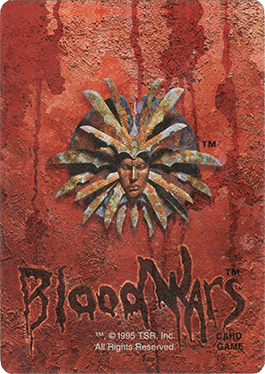
Blood Wars is an out-of-print collectible card game produced by TSR, based on the Planescape campaign setting from Dungeons & Dragons.
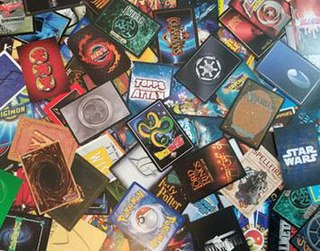
A collectible card game (CCG), also called a trading card game (TCG) among other names, is a type of card game that mixes strategic deck building elements with features of trading cards, introduced with Magic: The Gathering in 1993.
Imajica is a collectible card game based on the Imajica novel, and was published by Harper Prism in 1997.

The BattleTech Trading Card Game is an out-of-print collectible card game (CCG) set in the BattleTech universe. The game was developed by Wizards of the Coast (WotC) for FASA and released in 1996.
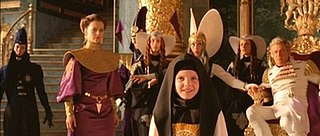
Multiple organizations of the Dune universe dominate the political, religious, and social arena of the setting of Frank Herbert's Dune series of science fiction novels, and derivative works. Set tens of thousands of years in the future, the saga chronicles a civilization which has banned computers but has also developed advanced technology and mental and physical abilities through physical training, eugenics and the use of the drug melange. Specialized groups of individuals have aligned themselves in organizations focusing on specific abilities, technology and goals. Herbert's concepts of human evolution and technology have been analyzed and deconstructed in at least one book, The Science of Dune (2008). His originating 1965 novel Dune is popularly considered one of the greatest science fiction novels of all time, and is frequently cited as the best-selling science fiction novel in history. Dune and its five sequels by Herbert explore the complex and multilayered interactions of politics, religion, ecology and technology, among other themes.
We've a three-point civilization: the Imperial Household balanced against the Federated Great Houses of the Landsraad, and between them, the Guild with its damnable monopoly on interstellar transport.

Killer Instinct is an out-of-print collectible card game (CCG) by Topps based on the Killer Instinct video game.

Aliens Predator Customizable Card Game is a three-player collectible card game (CCG) that was published in 1997. It was considered one of the more successful CCGs during the late 1990s and was Harper Prism's first foray into the CCG market.
